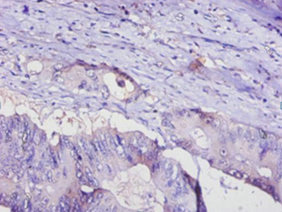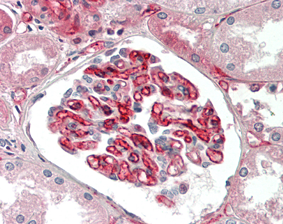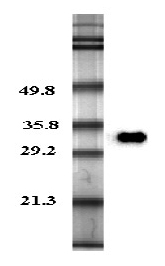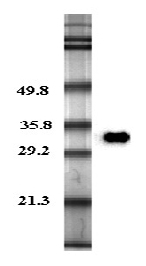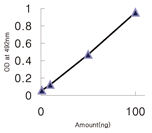
Binding to globular domain of adiponectin by direct ELISA using anti-Adiponectin (human), mAb (ADI 943) (Prod. No. AG-20A-0056).
anti-Adiponectin (human), mAb (ADI 943)
AG-20A-0056
ApplicationsELISA
Product group Antibodies
ReactivityHuman
TargetADIPOQ
Overview
- SupplierAdipoGen Life Sciences
- Product Nameanti-Adiponectin (human), mAb (ADI 943)
- Delivery Days Customer10
- ApplicationsELISA
- CertificationResearch Use Only
- ClonalityMonoclonal
- Clone IDADI 943
- Concentration1 mg/ml
- Gene ID9370
- Target nameADIPOQ
- Target descriptionadiponectin, C1Q and collagen domain containing
- Target synonymsACDC, ACRP30, ADIPQTL1, ADPN, APM-1, APM1, GBP28, adiponectin, 30 kDa adipocyte complement-related protein, adipocyte complement-related 30 kDa protein, adipose most abundant gene transcript 1 protein, adipose specific collagen-like factor, gelatin-binding protein 28
- HostMouse
- IsotypeIgG1
- Protein IDQ15848
- Protein NameAdiponectin
- Scientific DescriptionACRP30 was identified as a novel adipocyte-specific synthesized and secreted protein with structural resemblance to complement factor C1q. Like adipsin, ACRP30 secretion is induced ~10-fold during adipocyte differentiation. Plasma levels are reduced in obese humans, and low levels are associated with insulin-resistance. Treatment of db/db mice with TZD increased ACRP30 levels. - Monoclonal Antibody. Recognizes human adiponectin. Isotype: Mouse IgG1kappa. Clone: ADI 943. Applications: ELISA. Liquid. 0.2microm-filtered solution in PBS, pH 7.4. Contains no preservatives. ACRP30 was identified as a novel adipocyte-specific synthesized and secreted protein with structural resemblance to complement factor C1q. Like adipsin, ACRP30 secretion is induced ~10-fold during adipocyte differentiation. Plasma levels are reduced in obese humans, and low levels are associated with insulin-resistance. Treatment of db/db mice with TZD increased ACRP30 levels.
- ReactivityHuman
- Storage Instruction-20°C,2°C to 8°C
- UNSPSC41116161

